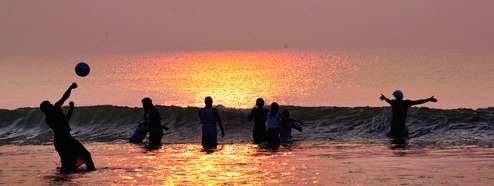
New Delhi: The Union environment ministry has written to all coastal states seeking to develop 100 model beaches over the next three years where the water and beach area meet so-called "blue flag" standards set by an international non-government organisation.
Senior environment ministry officials said 10 beaches, one in each of India's coastal states, would be taken up during 2018 to meet blue flag standards through a project that would support local authorities to improve the management of their beaches.
The ministry has drawn up a list of the 10 tentative beach segments and is awaiting responses from state governments to advance on the project, the officials said.
The blue flag criteria set by the Foundation for Environmental Education require that the beach area should not be affected by industrial, waste-water, or sewage-related discharges and the water should comply with specified limits for physical, chemical and microbial contamination.
"The list will be finalised in consultation with states," a senior official said. "This is not a one-time clean-up plan, but aimed at sustained management of beaches. The idea is to showcase simultaneous protection and development of beaches."
India has a coastline of nearly 7,500km, with about 5,400km along the peninsular mainland, the rest along the Andaman and Nicobar and Lakshadweep islands. But even the country's best beaches don't meet the blue flag criteria.
An environment ministry initiative to help improve a stretch of Bengal's Digha beach under an integrated coastal zone management project initiated in 2010 provided "part inspiration" for the plan to develop blue flag beaches along the coastline, an official said.
In the Digha initiative, the ministry had helped local authorities with a sewage treatment plant, among other components of beach management. "The feedback we've received suggests there is an increase in the footfall in Digha - this is something we'd like to see elsewhere too," the official said.
The officials indicated that some rules governing activities along coastal zones may need to be tweaked to achieve the project's objectives. "How does a rule help if it doesn't allow the construction of even a urinal along a beach," an official asked.
The blue flag criteria, among other requirements, specify that algae vegetation or natural debris should not be left on the beach, waste disposal bins must be available along the beach in adequate numbers and toilets along the beach should have controlled sewage disposal.
The blue flag programme for beaches has been operating in Europe since 1987 and outside Europe since 2001 when South Africa joined the programme. The programme's website says over 4,400 beaches in 45 countries have earned this ecological label.
"It challenges local authorities and beach operators to achieve high standards in four categories: water quality, environmental management, environmental education and safety," says a document on the blue flag criteria.










